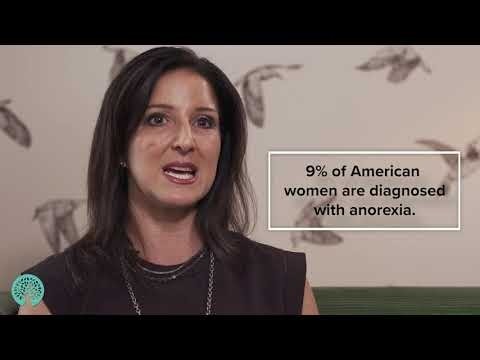
What is anorexia?
Anorexia is a serious and potentially fatal eating disorder.
People with anorexia are fixated on their body size, weight and shape, and do not consume enough nutrients to maintain their weight. They often have a distorted body image.
The health complications associated with anorexia can potentially affect every organ in the body. With support from experienced eating disorder professionals, people can recover from this condition.

Real People. Real Stories. Real Progress.
Our expert care teams ensure people of all ages, races and gender identities get the exact support they need at each stage of their recovery. With the right care, lasting healing is possible – and we have the data to show it.
73% of patients no longer reported significant eating disorder symptoms
What causes anorexia?
Anorexia can have multiple causes, including biological, psychological, and sociocultural factors. Some of the causes include a family history of eating disorders or mental health concerns, past traumas or experiencing multiple adverse life events.
Please know that anorexia is not a choice, it is a complex mental health disorder.

Genetic causes of anorexia
Although there is no one cause of anorexia, we have known for years that there is a genetic link. However, this does not mean that there is a particular anorexia gene. Some researchers believe there may be hundreds of genes related to the disorder.
Family history of eating disorders
Twin and family studies have yielded strong evidence that anorexia nervosa, and other eating disorders, runs in families. The heritability of anorexia has been reported between 40% and 60%.
Relatives of individuals with anorexia nervosa are 11 times more likely to develop the illness than relatives of individuals without the disorder. Although we do not inherit eating disorders, we can inherit a vulnerability to having one.
Co-existing illnesses and personality traits
Researchers have identified correlations, and possible genetic overlap, between anorexia nervosa and other psychiatric disorders such as depression, anxiety, and obsessive compulsive disorder as well as certain personality traits.
The heritable nature of these traits, including harm avoidance, perfectionism, and inflexibility, suggests the relationships may be genetic.
What the research shows
Genetic linkage studies and genome-wide association studies of anorexia are being conducted to increase our understanding of the role of genetics in anorexia risk.
Psychological causes of anorexia
Psychological factors can also play an important role in the development of anorexia. Certain characteristics and experiences that are common to individuals with anorexia may place a person at greater risk for the illness, including:
- Perfectionism
- Low impulsivity
- Harm avoidance
- Low self-esteem
- Anxiety
- Low self-directedness
- Overvaluation of body image
These factors are often considered to be maintaining features that contribute to the perpetuation of the illness and can be directly targeted during treatment.
Perfectionism
Perfectionism refers to a personality style where an individual strives for flawlessness, is highly concerned with approval, and may be extremely self-critical regarding performance. Mistakes are often viewed as personal failures – and something to be avoided at all costs.
For individuals with anorexia nervosa, high levels of perfectionism can be seen within the illness (e.g., strict rules around eating and food) as well as outside of the illness (e.g., extremely high standards and expectations for themselves in academics, work, etc.).
Anxiety
Anxiety disorders and anxious personality traits are very common among people with anorexia and are often present prior to the development of the eating disorder.
Mealtime anxiety can be extreme, even phobic-like. The use of avoidance behaviors to manage anxiety (e.g., restrictive eating) may contribute to the persistence of the illness.
Low self-directedness
Self-directedness refers to the ability to adapt behaviors in a way that is consistent with desired and value-driven goals. It involves the careful evaluation of a situation and development of a thoughtful plan of action.
Individuals with anorexia often possess reduced levels of self-directedness. Because of this, there is a tendency to react in a way that may alleviate an immediate concern but is not necessarily in line with long-term goals and values.
For example, someone in treatment for anorexia may decide to skip a meal as a way of solving the immediate problem with their body image. Although this may help in the moment, it also serves to perpetuate the illness – which is not the desired outcome.
Sociocultural causes of anorexia nervosa
Social networks, media influence, and cultural norms relating to eating and appearance have been linked to anorexia, including the pursuit of the “ideal body” and the overvaluation of appearance as a measure of success and worth.
Messages promoting unrealistic beauty standards that place high value on achieving a certain look (thinness, muscularity) can create pressure to engage in behaviors, like dieting, that place certain persons at greater risk.
Other social influences include involvement in specific activities, groups, or occupations that emphasize weight and appearance.
The thin beauty ideal
Studies have demonstrated that cultural pressures to achieve the thin beauty ideal can lead to increased body dissatisfaction and weight concerns, which may then contribute to the development of anorexia nervosa.
Being bombarded with media images of extremely thin models, for example, promotes the internalization of anti-fat attitudes and the need to control weight. With modern developments like social media, Western ideals and values have been disseminated globally.
Recent studies have demonstrated increases in eating disorders in non-Western cultures as well as minority groups.
High-risk social environments
Certain environments have been shown to create an increased risk for the development of anorexia nervosa, including:
- Participating in sports that focus heavily on weight (e.g., running, dancing, wrestling, gymnastics)
- Belonging to a sorority
- Working in a field highly reliant on appearance and image (e.g., modeling or acting)
These environments can create additional pressure to achieve a certain weight and/or appearance in order to achieve “success.”
Anorexia symptoms
Anorexia can have long-lasting and serious health consequences. Weight loss and compulsive exercise are two of the most common symptoms, along with behavioral changes like withdrawing from social engagements or refusing to go to school.
Extreme changes to eating and exercise behaviors can cause multiple health risks, including:
- Heart problems
- GI problems
- Dry skin
- Osteoporosis
- Hormone changes

Anorexia in males
Anorexia can affect people of all genders. Learn more about how anorexia may show up in males.
Anorexia in teens
Eating disorders often show up during adolescence. Read our guide to understanding anorexia in teens below.
Types of anorexia
There are two subtypes of anorexia and each one has different symptoms: the restricting type and the binge/purge type.
Some people with anorexia will not have a very low body weight, which is commonly known as atypical anorexia.
Physical symptoms
Although anorexia symptoms will vary from person to person, these are the most common ones seen in our treatment center.
Low Weight
A common symptom of anorexia may be low weight. Low weight may not always be obvious and will depend on a person’s age, sex, developmental stage, and physical health. Low weight can be defined as weight less than minimally normal or expected (for growing children and adolescents).
Dramatic weight loss
Besides having a low body weight, someone with anorexia may have a significant decrease in their weight within a short period of time. Be aware of dramatic weight loss occurring over a short period of time.
Exercise
Another sign that someone may have anorexia is when they are demonstrating excessive or compulsive exercising. Exercise routines can become extreme and interfere with daily life activities.
Many people who exhibit compulsive exercising may feel the need to work out several times a day, even canceling plans or staying away from social situations to do so.
Bradycardia
Another serious symptom is bradycardia, which is when someone’s heart beats at a lower rate than normal, which is 60 beats per minute. This occurs in about 95% of patients with anorexia and is due to the conservation of energy in the nervous system.[1]
Lack of menses
Someone who is suffering from anorexia may also experience an absence of or delayed onset of their menstrual cycle or experience a lighter than normal menstrual cycle.
Hypotension and orthostasis
When someone with an eating disorder isn’t getting the right amount of nutrition, they may experience low blood pressure (below 90/60 mm Hg) and orthostasis, which occurs when your blood pressure drops due to a positional change (i.e., standing or sitting up).
Hair growth on the body
Lanugo is the growth of fine, downy hair on the face, arms and other areas of the body. This can occur with anorexia.
Hair thinning/loss
Finally, another physical symptom one may experience is hair thinning or hair loss due to nutritional deficiencies. When people don’t get proper nutrition, their hair becomes thinner.
Gastrointestinal complaints
Someone suffering from anorexia may experience nausea, stomach pain, bloating, vomiting, constipation, and dizziness.
Fatigue
Fatigue is often seen and can be a result of decreased intake of food and nutritional deficiencies. After a while this can lead to extreme exhaustion.
Dehydration
Individuals with anorexia may experience dehydration associated with restrictive eating– even if they are drinking water. This occurs because a large percentage of dietary water comes from food. Dehydration can become a serious health risk if not treated.
Behavioral symptoms
Along with concerning physical symptoms, people with anorexia may demonstrate concerning behaviors. Family members or friends can look for these warning signs below.
Calorie restriction
If you observe someone restricting their calories or food intake for an extended period of time, this could be a sign of anorexia.
Food obsession
Another warning sign is witnessing someone who appears to be preoccupied with food, their weight or calorie intake. They may keep track excessively and may also have an obsession with dieting behaviors. Sometimes an interest in preparing food for others may develop.
Sudden interest in dieting
Having a sudden interest in a diet could be another sign of an eating disorder. This person might be researching diets, have a diet app or might be sharing their interest in a new diet or fad.
Fear of weight gain
Someone who has an extreme fear of weight gain may be suffering from an eating disorder. They may weigh themselves excessively, make comments about “feeling fat,” keep track of their weight daily and get upset if they’ve gained or haven’t lost weight.
Refusal of food
Another warning sign of anorexia is the refusal of food. This may start out as just a small change but can expand to include more and more foods – ultimately whole food groups.
This can occur in many different age groups, but it’s common in those who have a fear of gaining weight due to their eating disorder
Strange eating habits or food rituals
There may be other eating habits or rituals involving food that someone with anorexia can experience. This could be counting foods, such as crackers or pieces of fruit or cutting up food into small pieces, excessive chewing, etc. Extreme forms of clean eating can be signs of orthorexia, a type of disordered eating.
Denial of hunger or weight loss
Someone exhibiting eating disorder behaviors may be in denial when it comes to their weight loss or even deny that they are ever hungry.
Compulsive exercising
Although this is a physical symptom, compulsive exercising is also a behavioral habit that one with anorexia nervosa may take part in.
Social withdrawal
Finally, someone who is withdrawing from their favorite social gatherings or who loses interest in their friends or family may be showing signs of an eating disorder.
How does anorexia affect the body?
Anorexia nervosa can affect nearly every organ system of the body. The most serious health risk is the risk of premature death. The short- and long-term health risks associated with anorexia and other eating disorders can be very serious and may require treatment from an experienced eating disorder professional.

Severe health risks
Anorexia nervosa is a very serious medical condition. If untreated, those who are suffering from this eating disorder may experience long-term health risks. Prompt treatment is essential to find recovery and reduce the odds of severe health complications.
Osteoporosis
Anorexia is associated with bone health issues. This can include osteopenia, fractures, osteoporosis, and more. The longer a person lives with an eating disorder, the more severe these problems will be. Additionally, some bone loss stemming from anorexia can be irreversible.[1]
Seizures
Another serious long-term health risk associated with anorexia is seizures. These can occur in people with bulimia as well. Loss of consciousness, incontinence, and muscle spasms can also occur.[2]
Anemia
People with anorexia often have a low level of red blood cells, which can cause fatigue, shortness of breath, dizziness, and rapid heart rate−all signs of anemia.
Infertility
Because of the toll an eating disorder can take on the body, infertility can occur in girls and women who have experienced severe anorexia.[3]
Death
Eating disorders can be fatal. In fact, anorexia nervosa has one of the highest death rates compared to other mental health conditions, second only to opioid overdose.
1. https://www.acute.org/blog/orthopedic-complications-anorexia-nervosa
2. F.E.A.S.T.: Seizures
3. Hoffman, E. R., Zerwas, S. C., and Bulik, C. M. (2011). Reproductive Issues in anorexia nervosa. Expert Reviews of Obstetrics and Gynecology, 6(4), 403-414.
Anorexia mortality rate
There are over 2,600 deaths per year from anorexia in the US.[4a] With a mortality rate of about 10%, the cause of these deaths are typically due to malnutrition, complications, and suicide.
The National Association of Anorexia Nervosa and Associated Disorders (ANAD) states, "eating disorders are among the deadliest mental illnesses."[4b] Thankfully, with treatment, people can recover from this potentially fatal illness.
4a. Trace, S. E., Baker, J. H., Peñas-Lledó, E., & Bulik, C. M. (2013). The genetics of eating disorders. Annual Review of Clinical Psychology, 9, 589-620.
4b. National Association of Anorexia Nervosa and Associated Disorders: Eating Disorder Statistics.
How to help someone with anorexia
The first step in seeking help for anorexia is to contact a reputable eating disorder treatment center. Effective treatment typically includes:
- Nutrition counseling and education
- Medical and psychiatric stabilization
- Intensive therapies
- Rest
- Medication management
Once the individual is medically and physically stable, the treatment team can start to address other physical and mental health concerns.

Anorexia nervosa treatment
One of the first priorities in anorexia nervosa treatment is to restore weight and achieve medical and psychiatric stabilization.
To support this, the providers here at Eating Recovery Center (ERC) provide around-the-clock nursing supervision, psychiatric care and medication management. Nourishing meals and psychosocial support help individuals make progress in recovery so they can step down to lower levels of care.
It is important to note that while our inpatient and residential programs offer 24/7 medical support to address the physical and psychiatric complications of anorexia, patients are not confined to a hospital bed or room. To the extent that they are physically able, patients participate in therapeutic programming and interact with a small community of patients and staff.
A holistic approach
To help patients build a foundation for recovery, ERC also offers:
- Evidence-based eating disorder therapies
- Nutritional counseling, education and support from registered dietitians
- Comprehensive family and caregiver support
- Alumni support
- Eating disorder support groups and community events
We firmly believe that a beautiful, serene environment is essential to healing. All of our eating disorder treatment centers are carefully designed with that in mind. ERC provides restful, spacious facilities that support the therapeutic process.
For individuals who would prefer online eating disorder therapy, we also offer Eating Recovery At Home, our virtual eating disorder treatment program.
Getting started with treatment
If you are seeking anorexia treatment for you or a loved one, start your journey by calling our clinical assessment team, staffed with compassionate, master’s-level clinicians.
We will assess your treatment history, current status, and personal needs to determine if you are appropriate for care.
From there, we will recommend an individualized treatment program, consisting of three stages:
- Medical stabilization
- Psychiatric stabilization
- Weight restoration (if indicated)
Lasting recovery from eating disorders is possible, and we are here to light the path forward.
Proper nutrition is key
Meals and snacks are an important part of anorexia recovery. Individuals that have been restricting foods, bingeing or purging are prescribed a personalized nutritional program based on their symptoms, underlying medical conditions and how long the eating disorder has been present.
Here at ERC, individuals meet with registered dietitians and therapists regularly, receiving education on food portions, food plating and nutrition.
The goal is to help each individual:
- Develop a healthy relationship with food
- Eat a variety of foods in a balanced way
- Enjoy foods in moderation
Once the patient is medically stable, one of the first goals of treatment will be to re-introduce standard eating habits as a way to normalize eating behaviors and food intake.
Treatment program options
Anorexia treatment is divided into multiple levels of care:
- Inpatient treatment
- Residential treatment
- Partial hospitalization treatment
- Intensive outpatient treatment (in-person)
- Virtual anorexia treatment
As treatment progresses, patients have opportunities to test recovery in real-world situations, including meal and activity outings as well as day and weekend passes.
Medically stable patients may step down to a lower level of care where the focus shifts to helping them understand the factors that maintain anorexia symptoms as they learn new recovery skills.
Working with their treatment teams, individuals identify recovery challenges and determine readiness for entry into a lower level of care with more autonomy.
Individual, family and group therapies, including art, psychodrama, relaxation, movement and yoga, are important parts of the treatment approach.
Get matched with the exact support you need.
With one conversation, our mental health professionals will help you better understand what you’re going through and what you need.
We will meet you where you are, listen to your story in a therapeutic setting, and match you with the level of support that meets your struggle.
Anorexia facts & statistics
Anorexia nervosa is a serious illness that impacts people of all ages, races, ethnicities and genders. It does not discriminate. Anorexia is also one of the deadliest mental health conditions. Below, we share the latest facts and statistics.

- 1 in 5 deaths in patients with anorexia is by suicide.1
- Standardized Mortality Ratio (SMR) for anorexia nervosa is 5.86 (SMR is a ratio between the observed number of deaths in a study population and the number of deaths that would be expected).2
- There are over 2,600 additional deaths per year from anorexia nervosa in the US.3
- 50 - 80% of the risk for anorexia is genetic.4
- 33 - 50% of anorexia patients have a comorbid mood disorder, such as depression. Mood disorders are more common in the binge/purge subtype than in the restrictive subtype.5
- About half of anorexia patients have comorbid anxiety disorders, including obsessive compulsive disorder and social phobia.5
- Hudson, J. I., Hiripi, E., Pope, H. G., & Kessler, R. C. (2007). The prevalence and correlates of eating disorders in the national comorbidity survey replication. Biological Psychiatry, 61(3), 348–358.
- Arcelus, J., Mitchell, A. J., Wales, J., & Nielsen, S. (2011). Mortality rates in patients with anorexia nervosa and other eating disorders: a meta-analysis of 36 studies. Archives of General Psychiatry, 68(7), 724-731.
- Trace, S. E., Baker, J. H., Peñas-Lledó, E., & Bulik, C. M. (2013). The genetics of eating disorders. Annual Review of Clinical Psychology, 9, 589-620.
- Ulfvebrand, S., Birgegard, A., Norring, C., Hogdahl, L., & von Hausswolff-Juhlin, Y. (2015). Psychiatric comorbidity in women and men with eating disorders results from a large clinical database. Psychiatry Research, 230(2), 294-299.
- Deloitte Access Economics. The Social and Economic Cost of Eating Disorders in the United States of America: A Report for the Strategic Training Initiative for the Prevention of Eating Disorders and the Academy for Eating Disorders. June 2020.
Available at: https://www.hsph.harvard.edu/striped/report-economic-costs-of-eating-disorders/
Closing the gaps in anorexia research
As one of the deadliest mental health illnesses, the research around anorexia nervosa is ongoing. While there are some gaps in the research on this eating disorder, our team is constantly doing their part to study and understand anorexia in order to improve our specialized treatment approach.

Anorexia books
Sick Enough by Dr. Jennifer Gaudiani
Find Online | Find at a Library
Decoding Anorexia by Carrie Arnold
Find Online | Find at a Library
Anorexia Nervosa A Resource Guide for Sufferers, Families and Friends by Janet Treasure, MD and June Alexander, PhD
Find Online | Find at a Library
8 Keys to Recovery by Carolyn Costin, MEd., MFT, CEDS, FAED
Find Online | Find at a Library
Brave Girl Eating by Harriet Brown
Find Online | Find at a Library
Family Eating Disorders Manual by Laura Hill, PhD
Find Online
Anorexia website resource
Anorexia FAQs
How dangerous is anorexia nervosa?
Anorexia is an extremely dangerous eating disorder. Without treatment, people with anorexia face a higher risk for premature death, often due to malnutrition, serious health complications or suicide. 1 in 5 deaths in patients with anorexia is by suicide.[1] Over 2,600 people die annually from anorexia in the US.[3]
[1] Hudson, J. I., Hiripi, E., Pope, H. G., & Kessler, R. C. (2007). The prevalence and correlates of eating disorders in the national comorbidity survey replication. Biological Psychiatry, 61(3), 348–358.
[3] Trace, S. E., Baker, J. H., Peñas-Lledó, E., & Bulik, C. M. (2013). The genetics of eating disorders. Annual Review of Clinical Psychology, 9, 589-620.
Can I have anorexia if I’m not underweight?
Yes, you can be diagnosed with anorexia even if you are not underweight. People experiencing the symptoms and health risks of anorexia, even if they do not have a very low body weight, can be diagnosed with atypical anorexia. The number of people diagnosed with atypical anorexia is growing. [6]
[6] Harrop, E.N., Mensinger, J.L., Moore, M. & Lindhorst, T. (2021). Restrictive eating disorders in higher weight persons: A systematic review of atypical anorexia nervosa prevalence and consecutive admission literature. International Journal of Eating Disorders: 54(8); 1328-1357.
What are the symptoms of anorexia?
Anorexia is associated with multiple physical and mental health concerns, including:
- A dangerously low weight or dramatic weight loss
- Lack of menses
- Dry, thinning hair
- Dry skin
- Fear of gaining weight
- Refusing to eat
- Compulsive exercise
- Gastrointestinal complaints
- Fatigue
- Dehydration
- Depression
- Anxiety
- Obsessive-compulsive disorder (OCD)
- Social withdrawal
- Trouble concentrating
How is anorexia treated?
Anorexia treatment starts with medical and psychiatric stabilization, along with weight restoration, if necessary. Along with medication management, patients with anorexia participate in therapeutic and nutritional interventions that provide support, education, and skill-building opportunities. Multiple treatment options are available, including inpatient, residential, partial hospitalization, intensive outpatient and virtual programming.
What are the warning signs of anorexia?
Weight loss, food restriction, excessive exercise, and fear of weight gain are some of the most obvious warning signs of anorexia. When a person is suddenly obsessed with dieting, withdrawing socially, performing poorly in school or at work, or experiencing unexplained health complications, they may have an eating disorder.
Hide Last Child Layout Div











